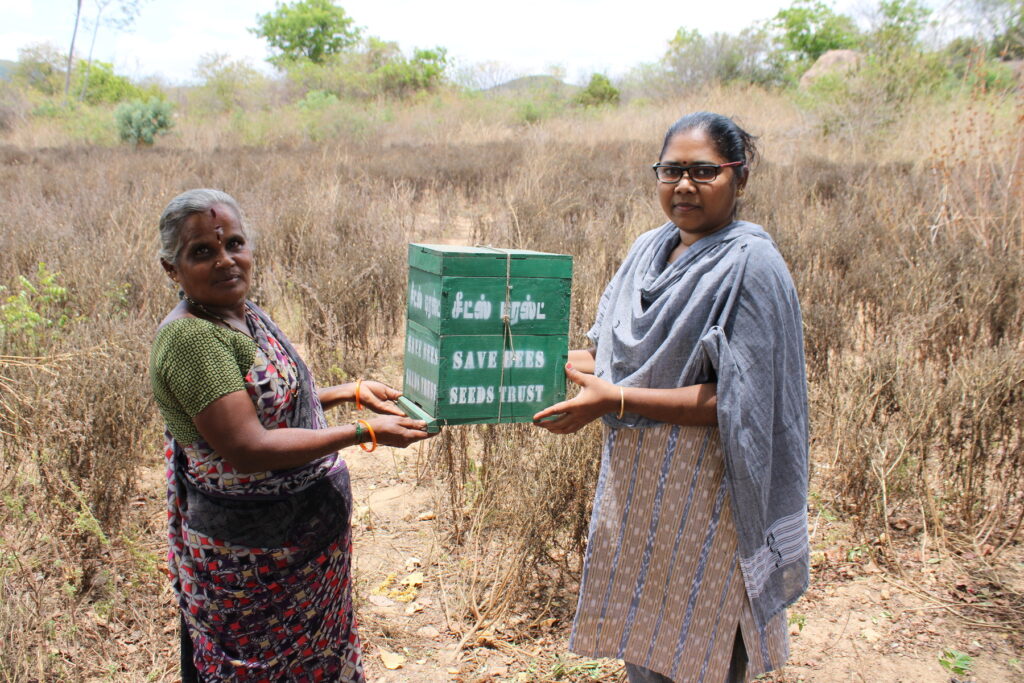SIANI’s expert group on pollination works with local organisations to promote pollination-friendly farming and beekeeping in South and Southeast Asia. One of the actors is SEEDS Trust from India and in this interview Muthusamy Palanivel and Raveendran Kannan from the organisation share their experiences from the beekeeping project in Tamil Nadu.
SEEDS Trust is a member of SIANI’s expert group on pollination, which runs Living Labs in India, Laos, Nepal and Sri Lanka. The aim of the expert group is to explore how pollination services, biodiversity and bees can enhance food security and livelihoods. This is very much in line with the work SEEDS Trust has been doing since it was founded by Muthusamy Palanivel in 1997.
SEEDS Trust now runs a Living Lab in Tamil Nadu that will contribute valuable knowledge about beekeeping as a source of income. We asked Muthusamy Palanivel and his colleague Raveendran Kannan what they have learned so far.
What is SEEDS Trust and what do you do?
SEEDS Trust works to improve the livelihoods of tribal people living in 120 small villages in the Ayyalur landscape of Eastern Ghats, Tamil Nadu, India, which is highly dependent on the health of the forest ecosystem. SEEDS Trust helps communities both protect forest resources and improve their livelihoods in various ways. Tree planting is a key activity which is aimed at regenerating the landscape. Other activities relate to alternate income generation like cultivation of wild food crops and agro-forestry plantations, honey production at home, as well as the safe collection, value addition and collective sale of non-timber forest products. For children and the younger generation, the trust also conducts educational support programmes on conservation, climate change and livelihood generation.
Which outcomes do you aspire to achieve?
Firstly, we aim to address the dependence of the communities on the forest by reducing wild honey collection. This is done through awareness raising with cultural programmes, training and engagement of the women and their families in value-added marketing and alternate income generation activities like homestead honey production. The reduced dependence will conserve existing forest biodiversity and improve it in the long term.
Secondly, we will improve biodiversity by planting multi-layer vegetation like multipurpose trees, shrubs, creepers, wild food etc. This will also improve the annual income of the people, helping them reduce their dependence on migration for income generation. Reduced migration and the promotion of wild food consumption will contribute to better nutrition, education and upbringing of children, reducing incidences of child marriages and early childbirth, which can be the effect of the migration of the parents.
How has the expert group project been going this far?
We are running projects with beekeeping in the coastal Kanyakumari and Thoothukudi districts in Tamil Nadu where we are regenerating mangroves at three estuaries. Beekeeping among coastal communities has turned out to be challenging because of more rainfall days and because the fishing communities live far from the mangroves. So, we are now focusing our efforts more on other project locations in foothills and comparatively dry regions.
How can beekeeping create income opportunities for farmers?
Most of the participants in our project work at small-scale farms and as labourers at other farms. Beekeeping can provide local communities with more opportunities so that people can get additional income. Since honey production is managed by family members, it incurs minimal costs. It also generates income in the summer months, when there is less income from other sources. Furthermore, honey consumption in the family can bring improved diets and better nutrition. The supplementary income is vital for everyday necessities and children’s educational opportunities and ultimately makes people less dependent on working for others.
What does it mean for you to be a SIANI expert group?
Being a SIANI expert group means that we have the ability to expand our work in terms of improving pollination services, eradicating the use of pesticides and transitioning to chemical-free farming and more sustainable agriculture. It has also made it possible for our organisation to invest in agroforestry, which in a couple of years will lead to a wider range of flowers, boosting the biodiversity in the area.
What are your project plans looking forward?
For World Bee Day on 20 May, we host an event with a workshop where women will be talking about beekeeping. Moreover, we want to expand our work with beekeeping and create different models of hives based on the ecosystems and nectar availability.
We are also looking to create a centre with resources for beekeepers, such as repairs of damaged beehives as well as hosting honey sales. Another idea for the resource centre is to build a small guesthouse in connection with the centre. This makes it possible for researchers, students, and other visitors to stay closer to the community instead of at a hotel far away from the village.
